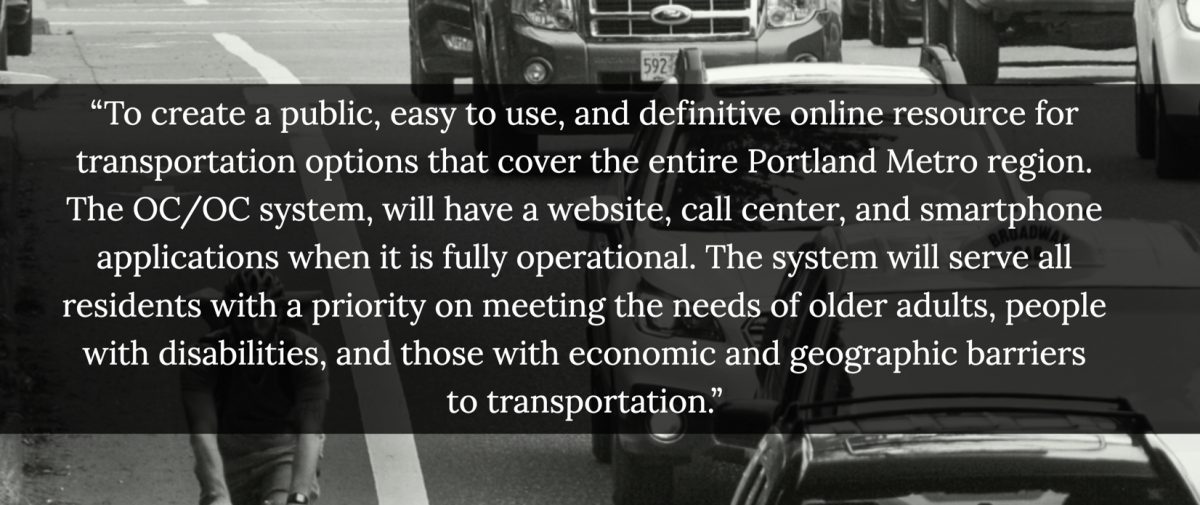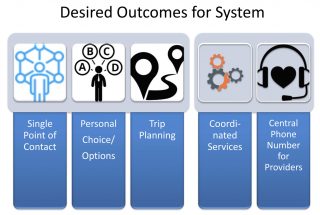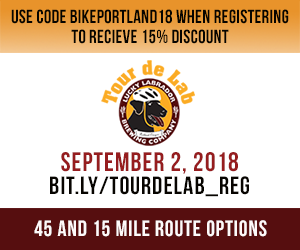
A panel answered questions about the benefits of the program at a workshop held at Metro in June. From Right to left: Jan Campbell, Chair of the Special Transportation Fund Advisory Committee; Adrian Pearmine, DKS Associates; Bob Stacey, Oregon Metro Councilor District 6; Brenda Durbin, Director of Clackamas County Social Services; Julie Wilkie, Executive Director of Ride Connection.
“Right now we have a second-class transportation system for folks that have accessibility issues and it just plain isn’t fair.”
— Adrian Pearmine, DKS Associates.
Seniors and people living with a disability who need accessible transportation across the Portland region have dealt with a patchwork of inadequate services for years.
A new initiative called Mobility for All hopes to change that by creating a one-call, one-click regional transportation information system.
Today, many communities in the Portland Metro do not have accessible or frequent transit, requiring residents with special needs to reserve rides days in advance in order to get around. Service varies significantly in rural communities, and getting across the region through multiple service providers can be daunting. One of those options, TriMet’s privately operated LIFT paratransit service, was recently under fire at a Workers Rights Board hearing in May for inadequate scheduling systems and long wait times for riders among other complaints from employees and community members.
“Right now we have a second class transportation system for folks that have accessibility issues and it just plain isn’t fair,” said Adrian Pearmine, the National Director for Smart Cities and Connected Vehicles for DKS Associates.
One Call-One Click (OC/OC) systems, like 2-1-1, can help alleviate some of these issues by making it easier to coordinate information across multiple agencies to provide better service. Likewise, a single endpoint makes it easier for residents to plan their travel and find options that work better for them.
The new initiative focuses on creating a centralized database and call center for transit resources in Multnomah, Clackamas, and Washington counties. At the highest level of investment, the system could provide coordinated ride booking, dispatching and payment. Jan Campbell, Chair of the Special Transportation Fund Advisory Committee (STAFC), who can only use public transit because of her disability, is most excited about possible on-demand service.
Consultants Laura Keyes and Marion Denny presented their findings on implementing a One-Click One-Call system to a room full of volunteers, disability advocates, and policy makers at workshop in June. The research was funded by ODOT Region 1 STFAC who set aside $100,000 to research how technology could assist with transportation for older and disabled residents through Federal (FTA 5310) and Oregon Special Transportation Fund grants.
Creating technology that is accessible to all is a key tenet of the system. The project manager, Kevin Chambers, who used to work for Ride Connection, a nonprofit transit service for disabled and senior residents, said that during his employment he was “constantly frustrated by how poor the technology tools are for serving people at the margins”.
Rebecca Miller, of Multnomah County Aging, Disability, and Veteran Services, said when the agency hosted listening sessions with over five hundred residents last year, transportation rose to the top. Non-English speaking residents were twice as likely to indicate transportation as an issue. For these reasons, a multilingual call center was identified as a must have.
Senior citizens, which grew to 13.6% of the Metro population in 2016, and non-seniors with disabilities, another 8.4% of the population in 2015, are less likely to own a computer, smartphone, or have access to the internet as their younger non-disabled neighbors, according to a 2016 Pew Research Study.
9-13% of our Metro population, up to 230,000 residents, could be users of the One Call-One Click service.
Put together, Keyes estimated that 9-13% of our Metro population, up to 230,000 residents, could be users of the One Call-One Click service.
And the need is growing. Oregon’s retirement population is growing faster than the national average. Turning in the car keys can be an isolating experience, particularly in more rural areas. Ride Connection, now in its 30th year, provided 500,000 rides last year to residents that needed door to door service, either directly or through the network of providers it supports. From 2014 to 2016, they saw a 28 percent increase in requested rides. Julie Wilkie, Executive Director of Ride Connection, pointed out they also turned down 40,000 trips. Coordinating information from multiple providers in the region could provide insights into our capacity and where future investments need to go.
The final report looked at programs that six other cities had initiated to coordinate multiple government and nonprofit services, and scoped different roll-out scenarios with different levels of service and cost. Tier 1 and 2, in the $110k-$175k range for development costs, would include leveraging open-source software to provide the central database and mobile app, and statistical tools and user feedback could be added with some customization. Tier 3 would provide the most service benefit, such as on-demand rides, and would need around $1 million in investments to develop.
Ongoing costs of $260,000 to $380,000 per year needed to maintain the service will be harder to find. However, according to Adrian Pearmine, “The kind of numbers that we were looking at earlier from the consulting team are a tiny drop in the bucket.” Sources like House Bill 2017, the statewide transportation package passed last year and Metro’s Regional Flexible Funds were identified as possible sources.
The project is currently seeking out grant opportunities and talking with partners. At the workshop in June, Bob Stacey urged advocates to look into the Regional Transportation Plan and see what it says about issues relating to mobility and accessibility.
With all the talk about equity coming from our elected leaders, this is a clear opportunity for them to deliver.
For more information check out the final report, or contact Project Manager Kevin Chambers at kc@fullpath.io.
— Catie Gould (@Citizen_Cate) and Emily Guise (@Eguise): Read more from their Adventures in Activism column.
Never miss a story. Sign-up for the daily BP Headlines email.
BikePortland needs your support.
The post ‘Mobility for All’ initiative seeks to create one-stop shop for transportation access appeared first on BikePortland.org.
from Latest headlines from BikePortland https://ift.tt/2wkIsWo




No comments:
Post a Comment